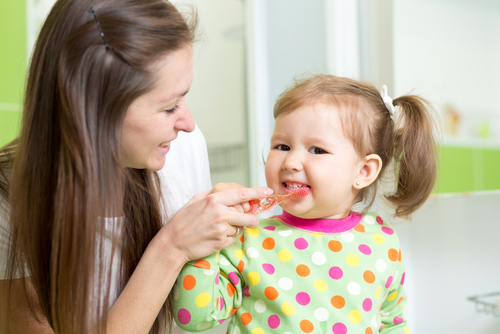Introducing Oral Care to Your Baby

In a previous blog we introduced the idea of turning routines into habits for small children. It’s important to establish such a difference, as one is more easily broken than the other. If your child can turn their oral health routines into oral health habits, they’ll forge a lifetime of tooth-friendly decisions.
However, if you have a brand new baby, you must start from the ground level. In order for your child to reach the state of oral health habits, you must first introduce the idea of a toothbrush, floss, and all the other wonderful items of the tooth care world! The information below may contain some valuable information about jumpstarting your baby’s oral care!
Pre-Teeth
It’s best to introduce babies to oral care even before they have teeth. This helps them grow accustom to someone cleaning their mouth before you need to actually start brushing their teeth. Start them early because it can be a little overwhelming for them at first. A baby doesn’t understand why someone may be rooting around in their mouth and therefore meet the action with extreme skepticism. This will make your job much more difficult when it comes time to actually brushing their teeth. However, if they’re already familiar with the idea of having their gums swabbed, brushing their teeth will not come off as such a huge shock to them. It also provides them with a little relief if they happen to be teething at the time. It’s a win-win for everyone!
Introducing Them to Their Tools
It may seem silly, but it is very beneficial to introduce your baby to a toothbrush and dental floss, in order for them to become more familiar with it. For a small child, they may think a toothbrush is a brightly colored toy that includes soft bristles at the end. They may try to play with it as opposed to using it to clean their mouth. It’s quite common for little kids to react this way when they are first introduced to these things. It’s also useful because you’re allowing them to hold it in their hand and attempt to bring it to their mouth. It’s good practice for when they become slightly more dexterous and learning to brush on their own. It helps develop the proper motor skills for them. It’s a small stepping-stone to reach on the path to creating an oral health routine for your baby.
Dental Floss is a bit different. It takes much more deft hand eye coordination when it comes to utilizing this tooth care tool. You can’t expect a baby to rip off the right amount of floss, wrap it around their fingers, and begin going back and forth between the teeth they do have. Those are some lofty goals. However, they will be doing it someday, so it’s still best to make sure you’re flossing for them. Again, this helps them get used to the idea of flossing. It’s one more piece of the puzzle that will ultimately be put together to create their proper oral health habits.
Remove the Negativity
At some point your child is going to react unfavorably when you suggest to them that they need to brush and/or floss their teeth. It’s just going to happen. However, you can control the way you will react. It’s easy to respond in an angry tone. However, even though the tone you use may work, it associates negative feelings with their oral health. When you’re met with a grouchy attitude from your child, do not return the same sentiment.
In fact, always be encouraging when it comes to your child’s healthy habits. This helpful tip is not solely associated with their oral health. Be encouraging when you see your child pick a healthy snack, get more exercise than, or choosing to read their favorite book as opposed to watching TV. We want the best for your baby for every aspect of their health. So when you see them brushing and flossing on their own, or performing some other action that is good for their overall health, let them know how proud you are of them! It helps turn those good routines into great life-long habits.
See More Staff Members See More Questions and Answers See More Testimonials